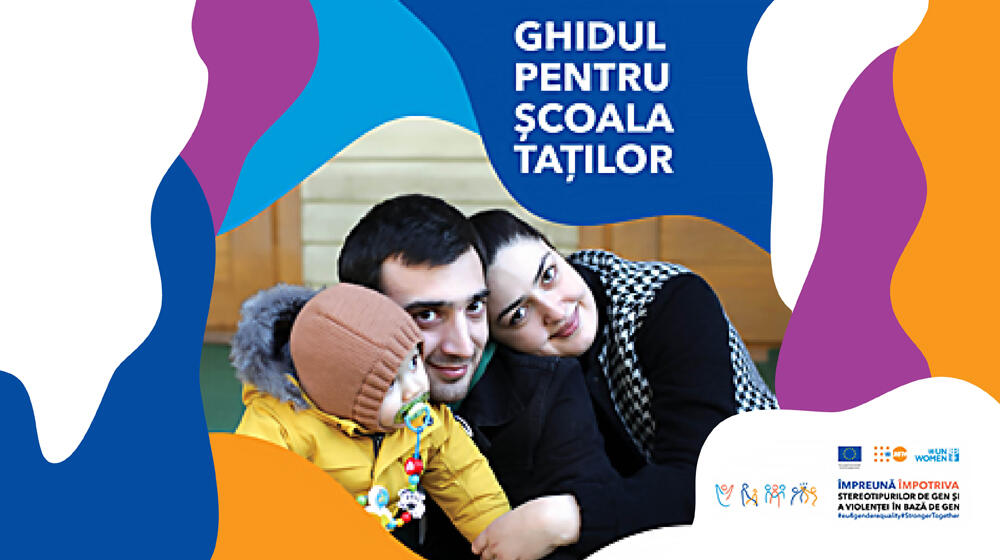It is for the first time for gender equality professionals from Moldova to gain access to a set of comprehensive guideline on the engagement of men in pregnancy planning, on their participation in prenatal and postnatal check-ups and at birth, as well as in raising and bringing up their children and in sharing house chores.
The guidelines were developed with European Union support under the ‘Together Against Gender Stereotypes and Gender-Based Violence’ Regional Program, implemented by UN Women and UNFPA in Armenia, Azerbaijan, Belarus, Georgia, Moldova and Ukraine.
There are four pieces in the set:
- The Papa Schools Manual – a manual for professionals that set up and facilitate Fathers Clubs. This manual guides them around communication with fathers in pursuit of exploring and questioning restrictive gender norms, while encouraging them to become more engaged fathers and partners.
- Compendium of good practices in active fatherhood, which includes a summary of Papa School programs implemented around the world, success stories, challenges and training activities in the field of active fatherhood.
- A Training Program for Healthcare Providers to help them involve men more during pregnancy and childbirth for better health and well-being of their partners and children, while also cultivating bonds and feelings.
- The Training package for healthcare professionals, meant to help the latter create spaces for men to reflect critically on the norms that deter them from fulfilling their parental responsibilities, and on the benefits of being engaged in child upbringing and education. This package also includes tools for evaluating policies and procedures meant to support the engagement of men in ensuring mother and child health, as well as simple recommendations for working with fathers.
The common goal of these pieces is to help change the perspectives on gender issues, eradicate gender stereotypes and prevent violence against women and children.
The first two resources will be piloted in the nine Papa Clubs from Fălești and Strășeni districts. Afterwards, the facilitators and the national experts will analyse the feedback of the participants – fathers and fathers-to-be, as well as the work process, and will adjust the resources to reflect the local needs. Additional activities will be also developed on the basis of these resources to respond to participants’ needs.
Facilitators will use the training package for healthcare professionals to deliver trainings for more than 200 general physicians and medical assistants from Strășeni and Fălești districts. The trainings aim to disseminate good practices of engaging men in prenatal and postnatal check-ups, as well as during childbirth. The available resources also include a range of materials and tools to assess health facilities’ capacity for encouraging men to participate in prenatal and postnatal care.
In Moldova, same as in other countries in the region, the proportion of men engaged on a daily basis in parenting and childcare is small. More often than not, mothers are responsible for raising and taking care of children. The ‘Generations and Gender’ Survey, conducted by UNFPA Moldova in 2020, shows that only two of 100 fathers in the Republic of Moldova put their children to bed at night, only 3% of Moldovan fathers play with their children when at home, and only four out of 100 fathers help children with their homework.
On the other hand, the studies into fatherhood and the father’s role in child development show that children whose father is engaged in their upbringing have a 40% lower risk to develop negative behaviours, such as alcohol consumption, drug addition, delinquent behaviour. Most of the children with engaged fathers have higher academic performances and are more assertive.
On the basis of these data, UNFPA Moldova and the European Union, with the support of the Information and Documentation Center on Child Rights, have established nine clubs in Strășeni and Fălești districts to support men in sharing housework and family responsibilities. As a result, since November 2020, more than 150 fathers and fathers-to-be have received support and resources enabling them to participate actively in child-rearing and activities traditionally regarded as female-dominated. Also, about 50 general physicians were trained during this same period how to involve as many fathers as possible in the pre- and post-natal check-ups and in childbirth.
The resources will be handed out to the facilitators of the Network of Papa Clubs and health workers from Strășeni and Fălești. They are also available online on the UNFPA Moldova website (link to site).
This article was produced as part of ‘Together Against Gender Stereotypes and Gender-Based Violence’ Program, funded by the European Union and implemented by UN Women and UNFPA Moldova. This Program supports gender equality, addresses perceptions about the roles of men and women in the family and in the society, and is meant to contribute to eliminating gender-based violence.
Contact data for the media:
Ludmila Bogheanu, Communication Officer, ‘Together Against Gender Stereotypes and Gender-Based Violence’ Regional Program, tel. +37369403016, email: bogheanu@unfpa.org


